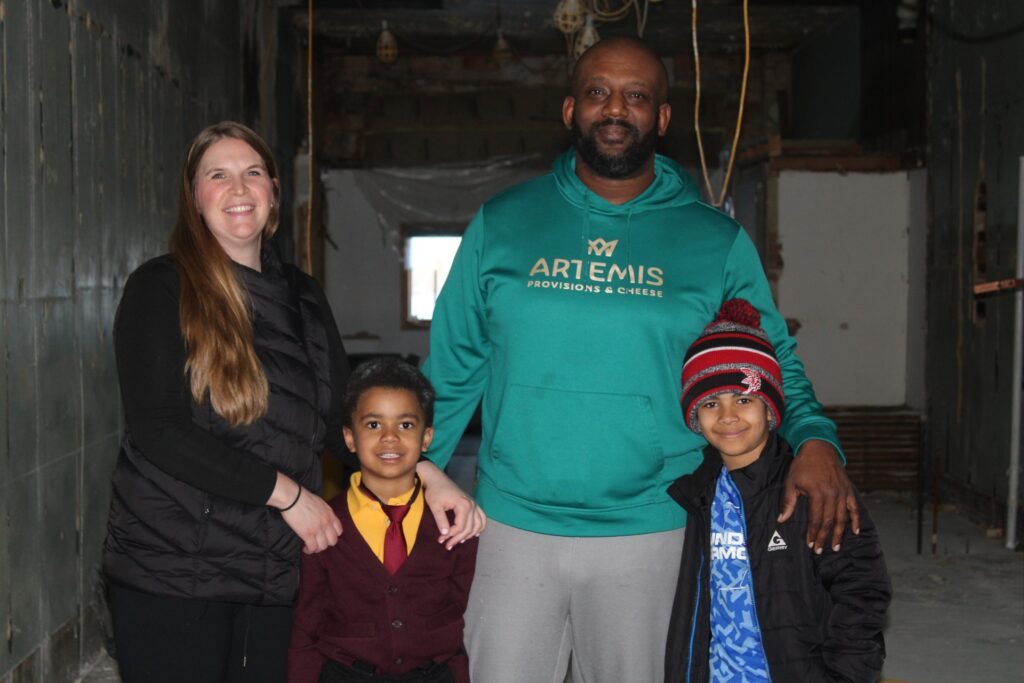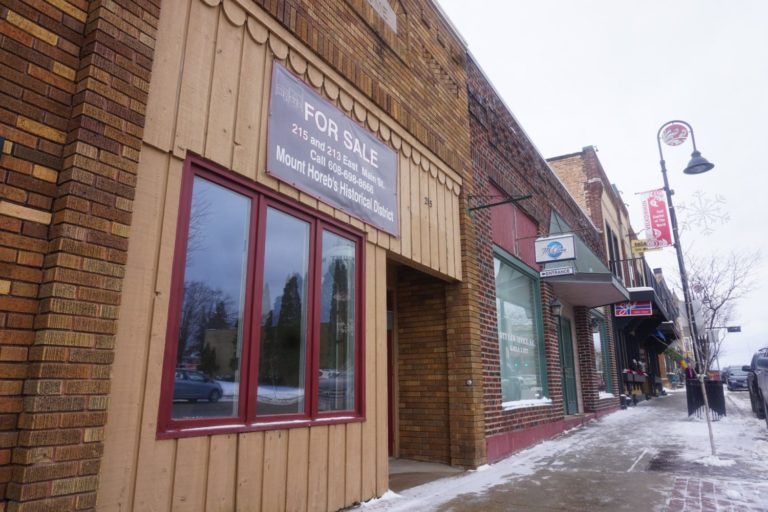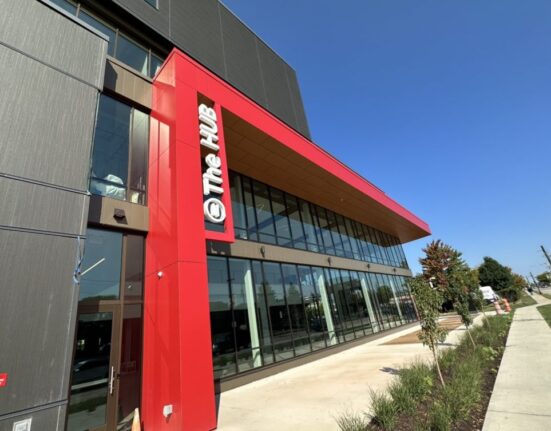
“Shoo them down back in that lane. Make sure the doors close behind them and that thing’s pulled up. Mix up a quick bucket of feed and pour it into each one of the pens. And then they’ll want to get back in.”
This is not the conversation one expects to hear in the middle of an interview with an entrepreneur about his new business. But entrepreneurship is often full of surprises.
Kingsley Gobourne took the call mid-interview from one of his newest employees, a man named Dane, whom he’s hired to help care for the pigs and cows he’s raising on a rented farm near Mount Horeb, about 15 miles west of Madison.
In his day job, Gobourne is Chief Equity and Engagement Officer at Group Health Cooperative of South Central Wisconsin. And for almost three years now, he and his wife Melissa have operated Artemis Provisions and Cheese on the side, catering events and selling locally produced meats and cheeses through online orders. They will open a retail location, restaurant and meat processing facility on Main Street in Mount Horeb later this year – about a year later than originally anticipated.
“I’ve always really been a farmer.”
Gobourne was born in Jamaica but spent most of his youth in Blanchardville, a village of about 800 people surrounded by farms along the Pecatonica River.
“Although we lived in town, I worked on a farm,” he recalled. “That was the only job. We had no Culver’s or McDonald’s to work at. Your options were limited, and you just worked with farmers.”
It came quite naturally, he said.
“I’ve always really been a farmer, I think. I’ve probably never wanted to admit it … When my family lived in Jamaica, we lived in the country. Everything that we ate, we had to grow,” he said. “We were not able to generate income to go to stores and buy things. So we raised our goats, milked the goats, you drink goat’s milk, you use goats for food. Chickens for eggs and for consumption as well. And everything else you just grew and survived.”
Many of his high school classmates and friends took over family farms, and their businesses took a real hit when the COVID-19 pandemic disrupted the food supply chain and distribution infrastructure in 2020. Already an amateur chef, Gobourne launched Artemis to give those local producers an outlet to sell the meat from their livestock. He and his wife started out offering some meats and cheeses to employees at a Meriter clinic – he was diversity and inclusion manager at UnityPoint Health Meriter at the time – and it grew from there.
The couple seemed poised to make their next big step over a year ago, when they announced they’d soon close on the purchase of two adjacent buildings on The Trollway – Mount Horeb’s historic Main Street – to open a retail shop and restaurant, which would be the first Black-owned business on the street.
But remember that thing about entrepreneurship being full of surprises?
Financing fell through not once but twice. They ended up not feeling comfortable with the first bank they approached. With the second, they made it almost all the way to closing before learning the bank would come through with less financing than they initially committed to. Ultimately, they found a partner in Summit Credit Union and finally closed on the building in December.
Gobourne said approaching just one bank at a time – and not shopping around for the right banking partner – was “an $84,000 mistake,” referring to the constant lawyer fees and other expenses the company incurred every time there was a delay.
“The obstacle is (that) no one else really cares. It’s not their money,” he said. “And I don’t mean that in a bad way. It’s not like this is deliberate, (or) the banks hate people. That’s not the case. But the reality is, when you’re a new business owner, small business owner, you have less capital, you have less resources at your disposal. And so your margin for error is just so small. That’s why so many small businesses take so long to make that jump up.”
In the end, they were able to pull together tax increment financing from the Village of Mount Horeb and a few different state grants along with the Summit investment. One potential source of funding they didn’t rely on are the grants and other opportunities intended to support minority-owned or woman-owned businesses – because they didn’t have the time to do that additional paperwork.
“There’s a Women’s Business Enterprise and a Black Business Enterprise certification that you can get that can help strengthen and support whether you’re looking for funding or grants or for lending. We hear these things (and say), ‘Okay, well, we’re gonna put that on a list of things that we need to do,’” Gobourne said.
Farm to table
They’ve already bought animals to raise and hired help to raise them, and will soon begin demolition to remodel an office building (which originally housed a car dealership and funeral home) into a retail shop, restaurant and butcher shop.
“Before our stores really open and we’re really able to process (meat), we still need to hire people to get things done,” Gobourne said.
Eventually, Gobourne estimates he’ll hire six to 10 people to work in the retail shop and another 12 to 16 to run the restaurant, mostly part time.
Gobourne said Artemis intends to keep organic, grass-fed beef, chicken and pork affordable by vertically integrating farm to table.
“The cost of animals and things of that nature fluctuate tremendously. And we want to make sure we’re continually delivering a local product, (so) we went upstream,” buying animals of their own to raise.
“Economies of scale makes it very affordable for a per animal breakdown,” he said.
Raising their own animals also keeps them grounded in every facet of their business, Gobourne said.
“We love being able to educate ourselves through the experience,” he said. “We think it’s really important to be able to actually know what we’re talking about, not from a sense that we read it from a book, or we took a butcher class. I raised this type of hogs, I raised this type of beef cows. It’s helped us lower some of our cost of goods coming in, and it’s helped provide a good experience. We understand breeds more and we can really speak to what we’re doing.”
Gobourne said he intends to build out a processing facility in the lower level of the building and contract with a processor rather than hire his own. He expects to process five to 10 cows per month, as well as hogs and chickens.
“We can’t grow them fast enough to harvest that much. So we’ll definitely need (animals from other farms) but we will be able to know that out of every five, one of those are ours. And that’s just a personal pride thing,” he said.
He also said raising his own animals has helped him understand where his vendors are coming from.
“I will be the first one to say there’s times in my past when I’ve been probably callous to try to negotiate, and say, ‘Hey, I need the best price.’ And farmers say, ‘this is what I need for the work that I’m putting into this animal,’” he said. “Well, when you’re out there, and the water is frozen, and you’re carrying buckets of water to an animal, and you’re cleaning out pens, and you’re trying to guard against pneumonia, because you don’t want to give animals antibiotics and medicine, you understand the time that goes into it. And you now want to advocate for those same farmers to make sure that they can get compensated in a way that their time is truly worth it.”
Gobourne said he’s committed to raising his own animals and buying the rest locally for a number of reasons – the most important of which is quality control.
“What we found is that if you have to use a third party vendor … unfortunately, you’re at the mercy of wherever they got their food from. If you rely on someone else in that processing piece, you’re relying on wherever they can get the product. And oftentimes, the cheapest is going to win out,” he said. “You can go to a feedlot, you go to an auction and buy a bunch of finished beef animals, (but) you don’t know where they came from, where they fed. And most importantly, the money you paid for them might end up in another state supporting another economy.”

“You just eat way too much”
Gobourne has partnered with a local chef to create a menu, then will hire a kitchen manager to execute the menu when the restaurant opens later this year.
“That’s probably why I’m as heavy as I am,” he joked. “The only fun part about this has been working on menus. We get to make test meals and talk about them and you just eat way too much food.”
While the retail shop will be open every day, the restaurant will serve dinner Thursday through Saturday night as well as Sunday morning for brunch.
“We’re trying to really kind of create an identity about what we want to offer. We have a lot of burger places in town. And those are great. We want to have a little different feel,” he said.
Gobourne reflects on the ups and downs of getting to this point, the only real regret being the delays and added expense around the financing. But it’s all been worthwhile, he said.
“As we sit here now, none of that really matters, right?” he said. “If it cost me $10,000 or it cost me $80,000 to get to this point, the point is, this is where I wanted to be. And we’re in a place where we can be successful. All the pain that I felt along the way … you don’t feel that when you get to this point.”
Artemis Provisions and Cheese expects to open at 213 East Main Street in Mount Horeb this summer.






